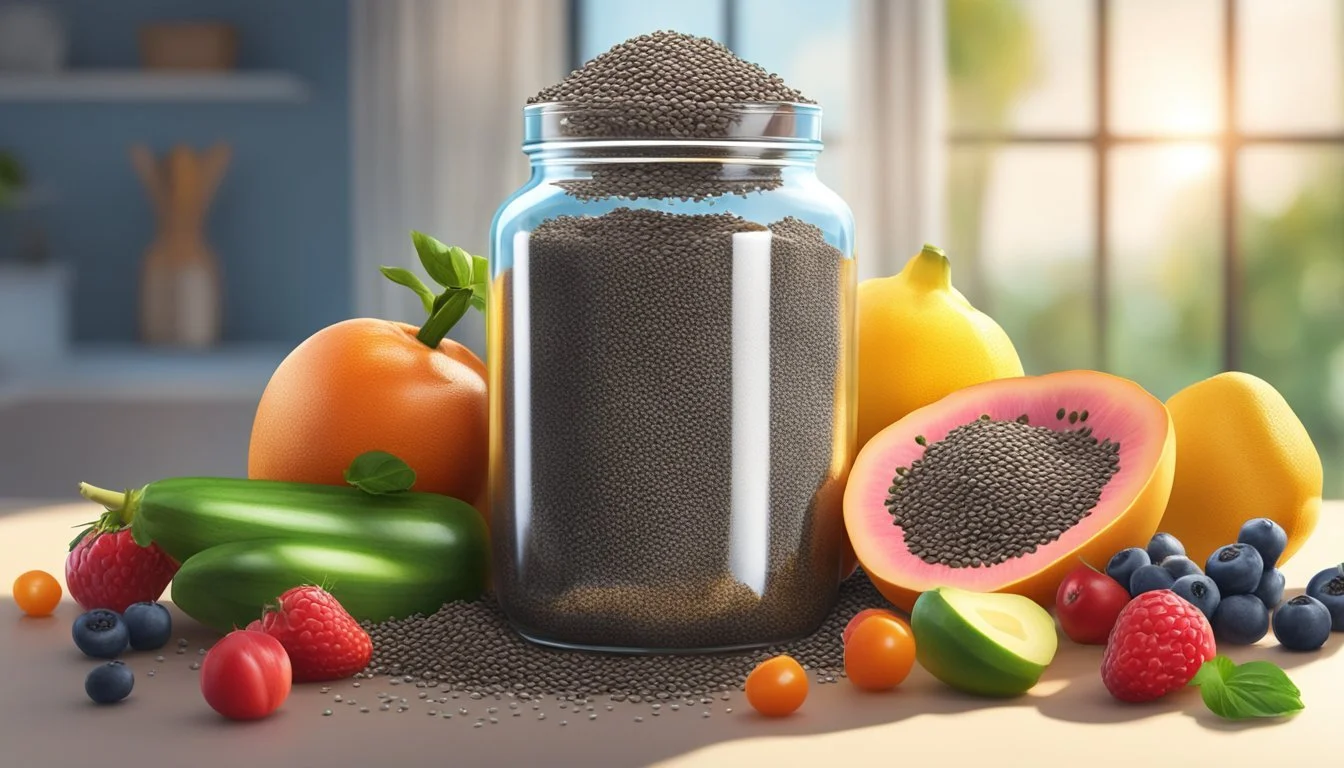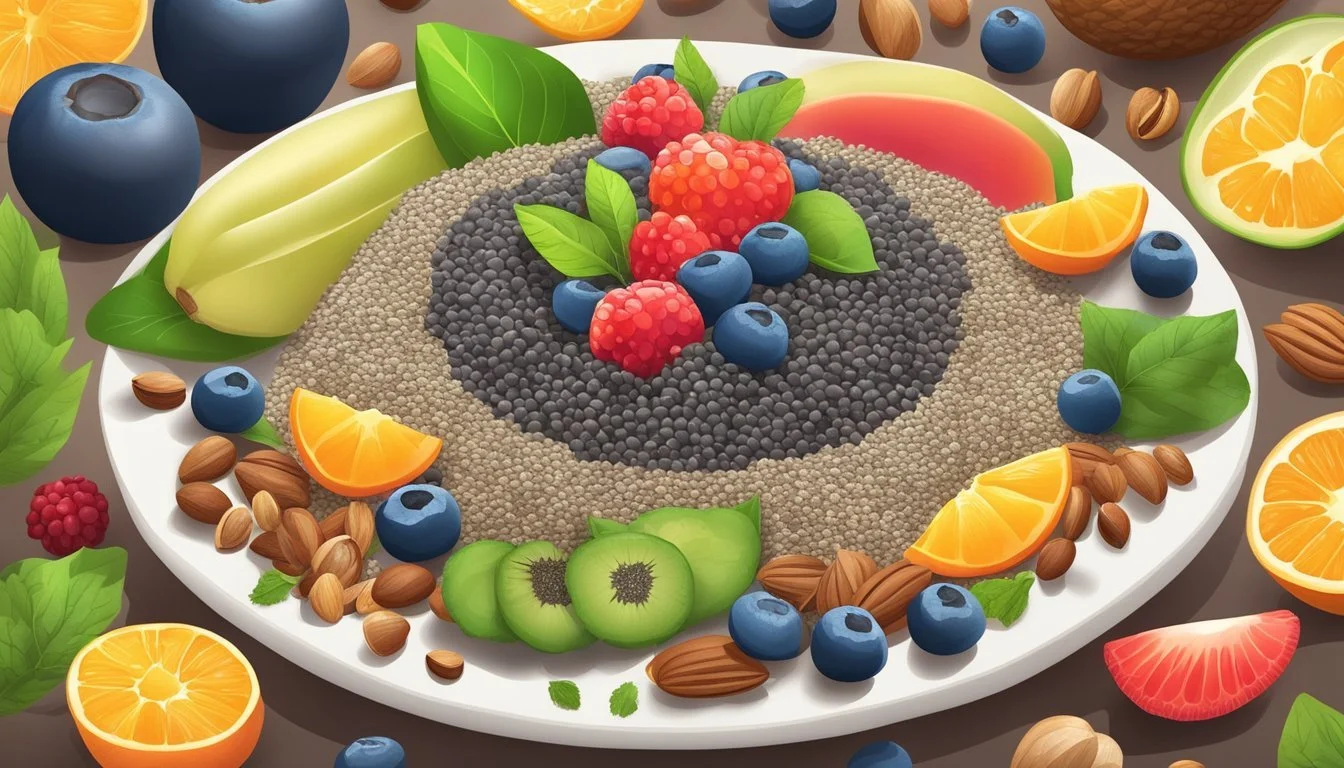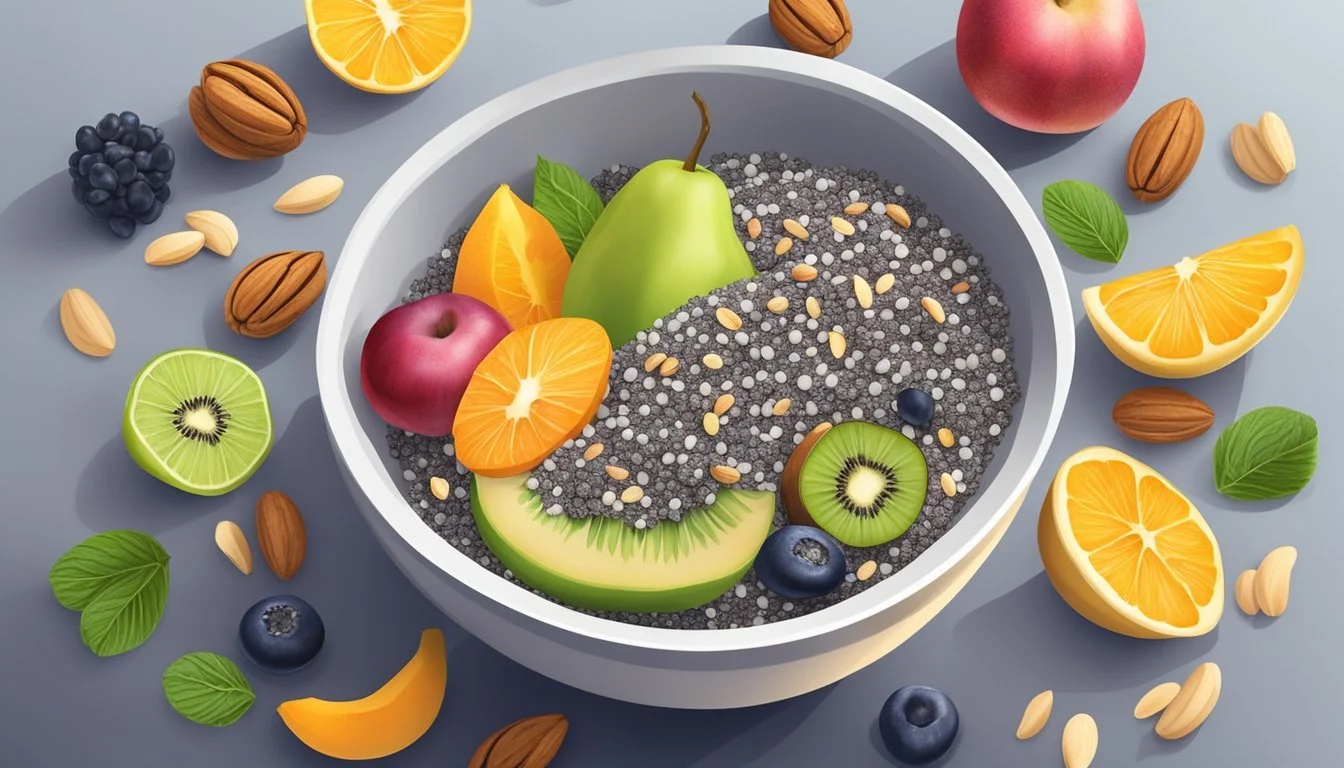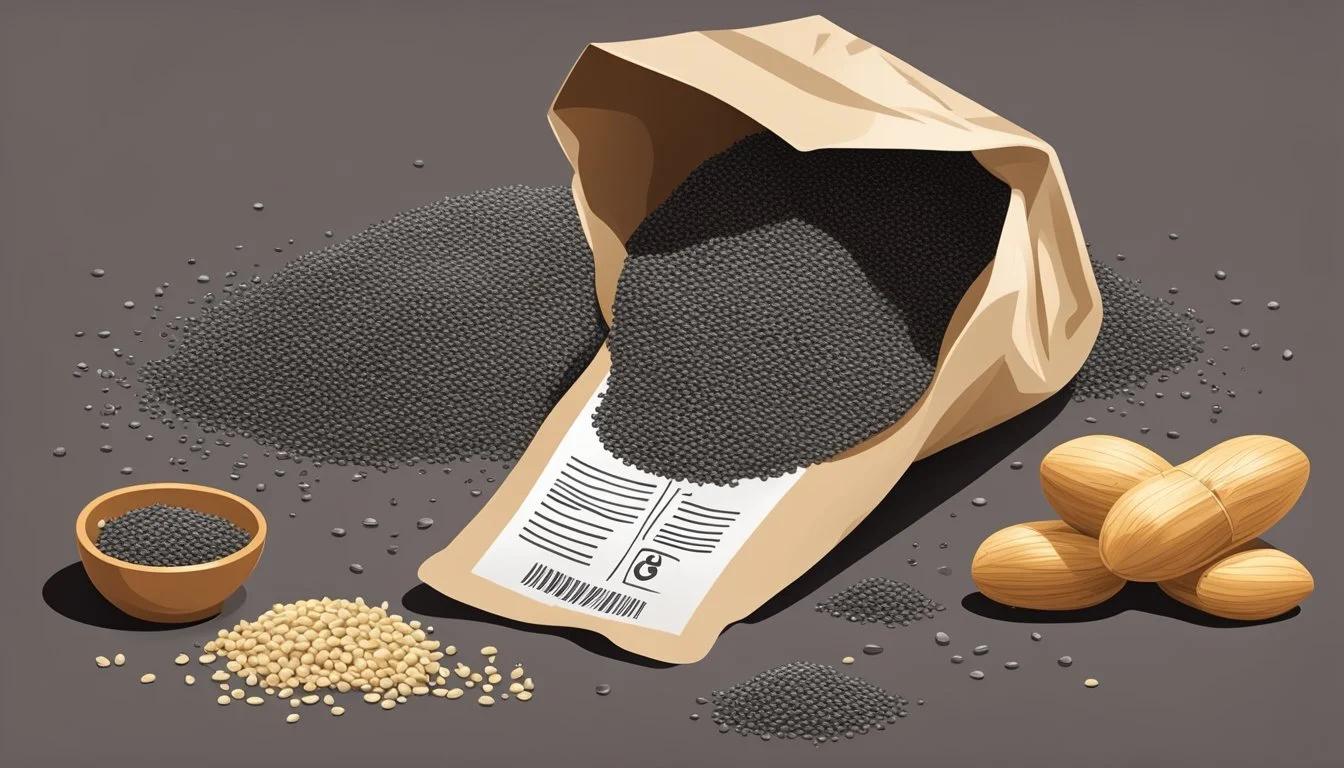Are Chia Seeds a Superfood or a Nutritional Fad?
Unpacking the Hype vs. Health Facts
Chia seeds have garnered considerable attention in the health and wellness community, often hailed as a 'superfood' due to their dense nutritional profile. These tiny seeds possess a remarkable concentration of fiber, protein, and omega-3 fatty acids, making them a beneficial addition to the diet, particularly for those seeking plant-based nutrient sources. Their versatility in culinary applications allows them to be easily incorporated into various foods, from smoothies to desserts, thereby making them a popular item on supermarket shelves.
Despite their popularity, there is ongoing debate about whether chia seeds truly deserve the 'superfood' label or if they are simply riding the wave of a nutritional fad. The term 'superfood' itself is not officially recognized by dietitians and nutrition scientists and often used by marketers to influence consumer behavior. Nonetheless, the high fiber content in chia seeds can contribute to a feeling of fullness after eating, which can support weight management efforts and overall satiety.
While the nutritional benefits of chia seeds are clear, considering the array of essential nutrients they provide, it is essential to approach them as part of a balanced diet rather than a singular solution to health. They offer a valuable source of nourishment to vegans and vegetarians and can positively impact health when consumed with a variety of other foods. This makes chia seeds a significant dietary addition, warranting the interest they've sparked in the nutritional community and beyond.
Chia Seeds Overview
Chia seeds have garnered attention for their impressive nutrient profile and historical significance. This section provides a focused look into the origin and botanical nature of chia seeds.
Historical Background
Chia seeds, or Salvia hispanica L., originate from Mexico and Guatemala and were a staple in the diets of ancient civilizations like the Aztecs. They not only used them as a vital source of nutrients but also for their medicinal properties and as offerings in religious ceremonies.
Botanical Profile
The chia seed comes from the Salvia hispanica plant, a member of the mint family, which grows natively in Mexico and Guatemala. Characteristically, they are small, oval, and have a mottled coloration of brown, gray, black, and white. Their ability to absorb water and swell in size is a notable feature utilized in various culinary applications.
Nutritional Composition
Chia seeds boast a remarkable nutrition profile, providing a dense concentration of essential nutrients that cater to various health aspects. They are known for their balanced blend of macro-nutrients and micro-nutrients, along with unique properties that distinguish them from other seeds.
Macro-nutrients
Chia seeds contain about 19% protein, offering a substantial source of this macro-nutrient which is vital for muscle building and repair. The amino acid profile of these proteins is comprehensive, making them a beneficial choice for vegetarians and vegans. Additionally, chia seeds have a high amount of dietary fiber, about 30-34 grams per 100 grams, which aids in digestion and helps maintain a feeling of fullness.
Fat in chia seeds is predominantly healthy unsaturated fats, including alpha-linolenic acid (ALA), an omega-3 fatty acid. Two tablespoons of chia seeds, which is roughly 28 grams, deliver 7 grams of fat, much of it being ALA.
Micro-nutrients
Chia seeds are a treasure trove of micro-nutrients, rich in minerals such as calcium, phosphorus, magnesium, and manganese. Just one ounce of chia seeds provides 18% of the Recommended Daily Allowance (RDA) for calcium. They also contain trace minerals like zinc and copper, vital for a myriad of bodily functions.
Vitamins are present in smaller quantities, but they still contribute to the overall nutritional value. Chia seeds offer vitamins such as B-complex vitamins, which are important for energy metabolism and maintaining normal cellular function.
Unique Properties
Chia seeds have several properties that set them apart from other seeds such as quinoa. One of their defining features is their ability to absorb water up to 12 times their weight, which results in a gel-like substance when soaked. This property is conducive for use in hydration and as a thickener in recipes.
Furthermore, the high antioxidant content in chia seeds not only contributes to their shelf stability but also combats oxidative stress in the body, which can prevent cell damage and support overall health.
Health Benefits
Chia seeds are recognized for their rich nutritional profile, offering a range of health benefits that contribute to various aspects of well-being, such as cardiovascular and digestive health, as well as blood sugar and weight management.
Cardiovascular Health
Chia seeds contain a notable amount of omega-3 fatty acids, predominantly alpha-linolenic acid (ALA), which is beneficial for heart health. The omega-3s in chia seeds can help reduce triglyceride levels, lowering the risk of heart disease. Studies suggest that chia seeds may also aid in maintaining healthy blood pressure and cholesterol levels, further contributing to cardiovascular health.
Heart Health: Frequent consumption can support heart function.
Cholesterol: May assist in reducing LDL cholesterol levels.
Blood Sugar Management
These small but potent seeds have been shown to improve blood sugar regulation, which can be particularly beneficial for those with type 2 diabetes. The high fiber content helps to slow down the absorption of sugar into the bloodstream, preventing spikes in blood sugar levels. Antioxidants such as quercetin and kaempferol present in chia seeds might also play a role in stabilizing blood sugar.
Type 2 Diabetes: Helpful in managing the condition.
Blood Sugar Levels: Stabilizes to prevent fluctuations.
Digestive Health
High in dietary fiber, chia seeds can support digestive health by promoting regular bowel movements and preventing constipation. The fiber also helps maintain a healthy digestive tract, contributing to the prevention of digestive issues and the absorption of nutrients. Including chia seeds in one's diet could alleviate digestive discomfort and support the management of chronic digestive conditions.
Constipation: The fiber in chia seeds can relieve symptoms.
Nutritional Value: Enhances the absorption of other nutrients.
Weight Management
Chia seeds are often associated with weight management. Their fiber and protein content can provide a sense of fullness, which might reduce appetite and help in controlling calorie intake. Additionally, the presence of healthy fats contributes to a sustained release of energy, which could prevent overeating and support weight loss efforts in a healthy way.
Energy: Long-lasting energy helps reduce frequent hunger pangs.
Bloating: Minimizes water retention and bloating due to high fiber content.
Dietary Uses
Chia seeds have become a versatile ingredient in a variety of recipes and dietary plans, appreciated for their high omega-3 fatty acid content, which can help with inflammation reduction, and their role in promoting a feeling of fullness, potentially aiding weight loss. Their gelatinous quality when soaked makes them a unique food with a range of applications.
Chia in Recipes
Chia seeds are a popular addition to smoothies, where their mild flavor complements fruits and vegetables without overpowering them. They also serve as a nutritious topping for cereal, yogurt, and salad. When mixed with liquid, chia seeds develop a gel-like consistency, which makes them ideal for creating healthy puddings and for use as a thickening agent in soups and sauces. Beyond these uses, chia seeds can be incorporated into baked goods, providing a boost of fiber and can be ground to a fine consistency to partly substitute flour. The seeds' ability to absorb water and fat also makes them useful in baking as a binding agent and egg replacer, making them a staple in vegan recipes.
Chia as a Dietary Substitute
Chia seeds are often used to reduce the carb content in dishes. Ground chia seeds, for example, can partially replace flour in baking, offering an alternative that contributes to a lower carb intake while still providing necessary texture. In creating chia gel, a combination of chia seeds and water may be used as a fat substitute in recipes, reducing the overall calories and modifying the sugar content without sacrificing moisture or consistency. Additionally, chia can substitute for egg in recipes due to its gelatinous quality when mixed with water, which makes chia particularly useful for those following a vegan diet or with egg allergies. By including chia seeds, individuals often experience an increased feeling of fullness, which can be useful for those managing their weight. Chia sprouts are also used in much the same way as alfalfa sprouts, making them an easy addition to salads and sandwiches.
Comparative Analysis
This section provides a detailed comparison of chia seeds with other recognized superfoods, and a balanced examination of their benefits and limitations.
Chia Versus Other Superfoods
Chia seeds compete with a variety of other superfoods in nutrient content and health benefits. For example, flax seeds are also rich in alpha-linolenic acid (ALA), an omega-3 fatty acid, similar to chia seeds. However, chia seeds have a distinctive edge due to their higher fiber content. Comparatively, quinoa, another seed often hailed for its superfood status, offers a complete protein profile, similar to the high-quality protein found in chia seeds, which is beneficial for vegans and vegetarians.
When considering hulled sunflower seeds, chia seeds provide similar mineral content but bolster nutrition with their significant fiber levels. Seafood like salmon is known for its omega-3 fatty acids, comparable to those found in chia seeds, but chia offers plant-based versatility for those with seafood allergies or dietary restrictions.
Chia seeds are often pitted against vegetables like kale and spinach for their high phytochemical profile. While these vegetables offer essential vitamins and potential for reducing inflammation due to their anti-inflammatory compounds, chia seeds similarly contain antioxidants that contribute to reducing oxidative stress and managing inflammation.
Benefits and Limitations
Chia seeds boast a range of health benefits:
High Fiber Content: Contributes to digestive health and can aid in maintaining a healthy weight.
Protein: Offers a good quantity of plant-based protein, important for muscle repair and growth.
Omega-3 Fatty Acids: These fats are known for their anti-inflammatory properties and may reduce the risk of chronic diseases.
However, limitations exist:
Allergies: Some individuals may experience allergic reactions to chia seeds.
Caloric Density: While nutrient-rich, chia seeds are also calorie-dense, which could be a concern for weight management if consumed in large quantities.
Anti-Nutrients: Like many seeds, chia contains compounds that may reduce nutrient absorption if not prepared properly.
In summary, while chia seeds are dense in nutrients and beneficial for overall health, they should be consumed in moderation and balanced within a diverse diet to harness their full potential without overreliance.
Scientific Research and Opinions
Chia seeds have been the subject of both human and animal studies, with debates focusing on their nutritional value and role in disease prevention.
Human and Animal Studies
Research on chia seeds (Salvia hispanica) has shown that they are a rich source of nutrients. They provide high-quality protein, substantial amounts of fiber, and are the richest plant source of omega-3 fatty acids. Studies have suggested that these nutrients contribute to a range of health benefits, like improving blood lipid profile which can potentially reduce the risk of heart disease.
In terms of diabetes management, the fiber in chia seeds is noted for its ability to stabilize blood sugar levels. Several studies have indicated that incorporating chia seeds into one's diet could help in managing type 2 diabetes. However, these outcomes vary, with some studies on animals not always directly correlating to human health results.
When it comes to combating cholesterol, chia seeds' omega-3 fatty acids and fiber have been associated with lowering LDL cholesterol and maintaining good HDL cholesterol levels. Animal studies have consistently shown these effects, while human studies, although supportive, call for larger and longer-term research to confirm these findings.
Nutritional Debates
While chia seeds are often hailed for their nutrient content, there is an ongoing debate about their designation as a "superfood." Detractors argue that the term is more of a marketing device than a clear category with scientific criteria. Nevertheless, nutritional experts agree that chia seeds contribute valuable nutrients that are essential for human health.
The potential effects of chia seeds on cancer prevention are still uncertain, with research on this aspect being rather limited. Similarly, the impact of chia seeds on allergies is also not well-established. There are few if any, documented allergic reactions to chia seeds, but those with allergies to related plants should proceed with caution.
Scientists generally acknowledge that while no single food can provide complete health protection, chia seeds are a nutrient-dense option that can play a role in a balanced diet. As with all nutritional research, interpretations should be made cautiously, and advice from healthcare providers should be considered.
Potential Risks and Considerations
While chia seeds are praised for their health benefits, it is essential to consider potential side effects and dietary allergies associated with their consumption.
Side Effects
Chia seeds are rich in fiber and omega-3 fatty acids, which can benefit heart health by potentially reducing inflammation and helping to lower blood pressure. However, they can also lead to bloating and digestive discomfort if not consumed in moderation. It's crucial for individuals to gradually increase their fiber intake to avoid these side effects. Additionally, due to their water-absorbing abilities, chia seeds should be adequately soaked or consumed with plenty of liquids to prevent them from expanding in the esophagus or intestine, which can cause blockages.
Dietary Allergies
Though uncommon, some individuals may experience allergic reactions to chia seeds. Signs of an allergic reaction include hives, itching, swelling, and difficulty breathing. Anyone with a history of food allergies, particularly to mustard or sesame, should be cautious when incorporating chia seeds into their diet. If allergic symptoms appear, one should discontinue use immediately and consult a healthcare professional. It is also recommended to introduce chia seeds slowly to monitor for any adverse reactions.
Conclusion
Chia seeds have garnered significant attention due to their nutritional value and potential health benefits. They are packed with essential nutrients that are beneficial for human health, such as omega-3 fatty acids, fiber, protein, and various vitamins and minerals. Their high fiber content, in particular, can aid in promoting a feeling of fullness and, consequently, might be useful in weight management strategies.
While some may speculate whether chia seeds are just another nutritional fad, the evidence points towards them being a superfood. Unlike fads that have little scientific backing, chia seeds have been subjected to clinical trials, suggesting a basis for the health claims associated with them.
Nutritional Profile of Chia Seeds:
Fiber: approximately 10.6 grams per ounce
Protein: roughly 4.5 grams per ounce
Omega-3 Fatty Acids: significant source of α-linolenic acid
Vitamins & Minerals: includes manganese, phosphorous, calcium, and zinc
Despite the promising aspects of chia seeds, they should not be viewed as a cure-all. Incorporating them into a balanced diet can yield benefits, but overall health and nutrition depend on a variety of foods and lifestyle choices. It's recommended to consume chia seeds as part of a diverse diet to harness their potential health-promoting properties.







